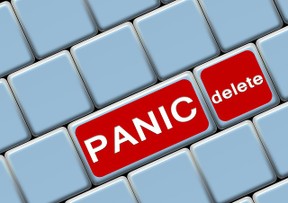 If you think that you've just entered an intellectual minefield, in considering ways to combat Holocaust denialists, then you'd be right.
If you think that you've just entered an intellectual minefield, in considering ways to combat Holocaust denialists, then you'd be right.
The temptation is therefore to simply make the issue go away, especially if you're not a trained historian.
Often it's not even a discussion about the Holocaust which prompts the arrival of such a troll. It wasn't on Wizzley, when we were visited by one. He subverted a debate about Suffragettes and the Titanic into denying the Holocaust. He didn't even attempt to demonstrate the relevance.
In those situations, there's even more impetus on moderators to delete revisionist comments. It's the equivalent of a chairperson intervening to keep the discussion on topic, so can neatly side-step any criticism of the action with reference to that.
Deleting the denier comments from your forum has the following advantages:
- Avoids providing a forum for Holocaust revisionism
- Doesn't leave the pseudo-science, twisted histories and dodgy 'facts' in a public place for casual readers to find
- Nips potential flame wars in the bud
- Keeps everything on topic, if the denier had diverted the discussion away from its true roots
It may appear to be the neatest solution of all, but this does open up a whole new can of worms. You open yourselves (and your whole website) up to accusations of stifling freedom of speech, disrupting the flow of information and promoting censorship.
As these are three of the hottest no-nos on the internet, enshrined in everything from the Hacker Ethic through the Cypherpunk movement, into the netiquette of most social networking forums, to underlying the ethos of cyber activist groups like Anonymous or whistle-blowers like WikiLeaks.
The notion that 'information wants to be free' has been so pervasive on-line for such a long time, that whole generations have grown up expecting it.
Deleting single-issue comments, like those perpetuated by Holocaust deniers, might seem like the sensible solution. But it risks eliciting a (probably silently expressed) black mark against your site and forum. People who couldn't care less about history, and all attendant factual debates, will now have your bit of the internet pegged as somewhere not acting within the spirit of the internet.
And that could be the most damaging aspect of all.


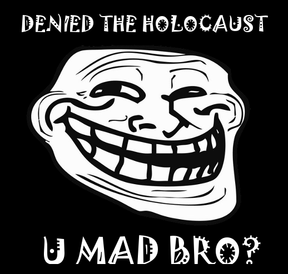 There's a long-held truth on the internet that meeting fire with fire merely causes a flame war inferno. That's generally expressed as 'don't feed the trolls'.
There's a long-held truth on the internet that meeting fire with fire merely causes a flame war inferno. That's generally expressed as 'don't feed the trolls'.


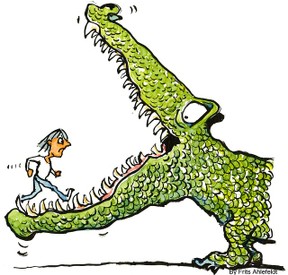 Yes, I have paraphrased the quotation in the title, in order that females don't think that they can just sit back and watch.
Yes, I have paraphrased the quotation in the title, in order that females don't think that they can just sit back and watch.


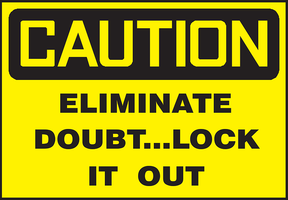 People like Ken McVay are motivated by considering who would be most likely to read the information on show.
People like Ken McVay are motivated by considering who would be most likely to read the information on show. 






 If you think that you've just entered an intellectual minefield, in considering ways to combat Holocaust denialists, then you'd be right.
If you think that you've just entered an intellectual minefield, in considering ways to combat Holocaust denialists, then you'd be right.







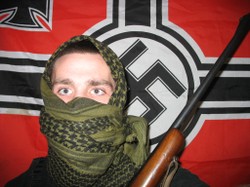
 St Tydecho's Churches in West Waleson 09/03/2014
St Tydecho's Churches in West Waleson 09/03/2014
 Goodies for an Outlander Premiere Partyon 03/06/2015
Goodies for an Outlander Premiere Partyon 03/06/2015
 Holocaust Memorial Day Interview with Rainer Höss, Grandson of Rudolf Architect of Auschwitzon 01/24/2015
Holocaust Memorial Day Interview with Rainer Höss, Grandson of Rudolf Architect of Auschwitzon 01/24/2015
 Romantic Valentine Gifts for an Outlander Fanon 01/16/2015
Romantic Valentine Gifts for an Outlander Fanon 01/16/2015

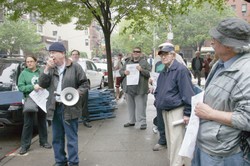
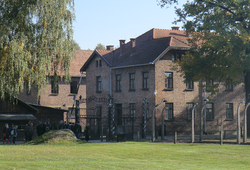
Comments
Repentance means 'changing direction'? I like that.
You do make very good point. Where I was heading with mine is that it's never one big evil which defines our path. It's the millions of tiny, petty evils along the way.
I agree that good and evil are in all of us, to differing degrees and at different times in our lives. But each life has a general direction one way or the other. You are fighting for truth, you work for human rights and you minister your faith sincerely, which shows that the general direction of your life is towards good; there may have been Nazis who did the occasional good act, but the general direction of their lives was wrong Ultimately, good and evil are not about the occasional acts that we perform, but the direction in which we travel.I believe that holocaust deniers are travelling in fundamentally the wrong direction,a path of lies that leads to bloodshed.
The word repentance was in Greek metanoia, which meant changing direction. Those who defend the Nazis are in radical need of redirection of life.
Frank - I'd not considered this in terms of the war between good and evil. I guess it's because I see the poles of both in all people.
I recently watched a documentary which interviewed two men who had worked in Auschwitz. It was fascinating to see their viewpoint. It was even more mind-blowing to imagine what I'd have done in their place.
The fact is that no one person was responsible for everything. Even the SS guards were each just one small cog in the whole machinery of genocide.
The bloke who counted the money taken from new arrivals could say, hand on heart, that he never killed anyone. The person who made the selections never dropped the gas pellets. The person who did that never chose which individuals were in the chambers etc etc.
They could each sit back thinking, 'I'm just one person, who can't change a thing, and who would be replaced instantly if I tried. This is much, much bigger than me.' It was only by working together that the full horrors of Auschwitz were able to occur.
Learning their stories gives us an even bigger into the petty evils of the everyday. One big evil occurred because millions of people were unable, unwilling or just plain too scared to not commit their little evils.
Ember - To me, that visibility is key. On somewhere like Reddit, where you can't delete comments, but you can downvote, that should be the baseline expression of disapproval. I do my best to counteract any argument that I see on there.
On Wizzley, I pretty much let the denier rant, because he was so incoherent that he was doing a great job of discrediting himself. Plus he was hit with a tonne of ridicule from everyone else. It's all very forum, and troll, specific.
Eva's IAmA was so big that I felt it imperative to argue against all of the deniers for all of the reasons that you stated.
I give up on your brother. :p But yes, the Nizkor Project was set up by a non-historian for non-historians, so they can fight back too. Ken McVay said that one of the reasons that he's so detested by revisionists is that a) he's not Jewish and b) he's not a historian. All of their usual 'zOMG he's part of the Zionist/historian conspiracy to take over the world!!!!' cries don't work for him.
There is one point that is fundamental and overlooked: the holocaust was born of evil and was evil's greatest expression, just as every act of genocide is. There is force/presence of evil in the world, it wanted the holocaust, I believe, and it wants it back again. Against this evil we on the side of good are ever at war, and there is no neutrality. All holocaust deniers take the side of evil, and we must ever oppose them.
I'm torn whether to answer 'yes' or 'no' above. I think that simply put the 'stupid' ones are pretty much just trolls. in which case, not really engaging them is the best way to deal with it. It is the ones which are more sly and intelligent in the ways they're trying to deceive people that can be dangerous, and who I think should be addressed. I think it is important that if that information is put out in a public forum that is getting a lot of visibility that they should be refuted so that the casual readers passing through get the accurate historical facts displayed alongside the posts which may otherwise cause reasonable doubt.
I know that for example, with Eva Mozes Kor's AMA on reddit, there is a comment from Holocaust deniers coming just off one of the top comment threads which caused other redditors who were there speaking to Eva to pause and question it. They weren't being nasty or trolling or what have you, they just basically opened a discussion. Smart in how they were trying to deceive others. (To the extent of the redditor now doubting saying a longer version of 'Huh, it seems Holocaust deniers just reasonably refute some of the data, they're not hateful/anti-Jewish like I assumed'). In that case, is it worth identifying what they actually believe and then refuting it? Since someone now clearly trusts their word more. And because the discussion is already there, and getting attention. I think it is.
I think in one sense knowing what they believe and how to refute it, like the Nizkor project does can be a useful tool, since the average person might not be able to discern what their arguments are, having a resource which identifies them can be important. But I also see the arguments against it. I have jokingly commented that my brother is the only person I know who could watch "American History X" and walk away having their racism confirmed. Where that came from though, was because they had the ex-Neo-Nazi telll his story, and it was explaining what he used to believe that my brother connected with. So, it does make sense that highlighting the arguments could draw more people to them. :/